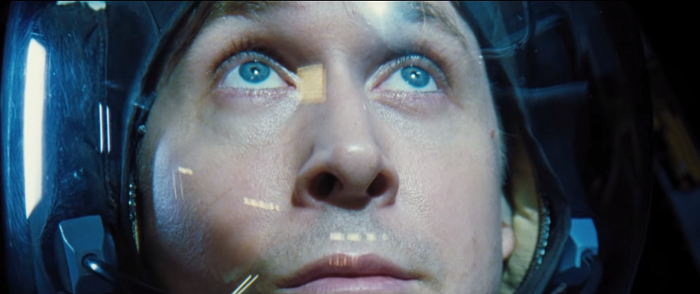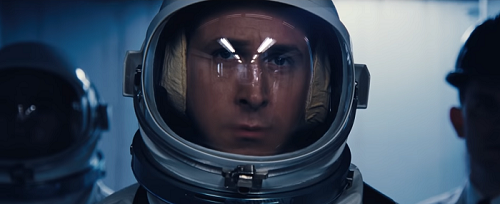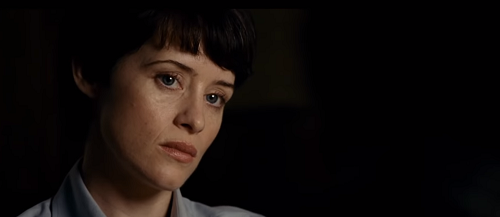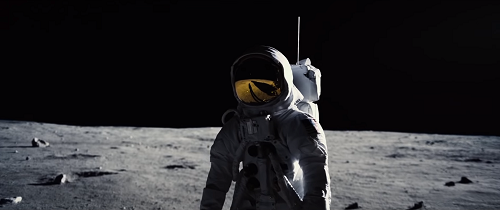By Roxana Hadadi | Film | October 12, 2018

More than anything else, I think Damien Chazelle is fascinated by effort—by the passion people have for certain very specific things, and the energy they exert to become perfect at it, even when the odds seem laughably low. The single-minded obsessiveness of Miles Teller’s drummer in Whiplash, struggling to understand the difference between rushing and dragging; Mia and Sebastian’s varying dreams of artistic fulfillment and fame in La La Land, paths that lead them away from each other but toward individual personal success; and now the space race in First Man, the challenge issued by President John F. Kennedy to get us to the moon.
“We choose to go to the moon in this decade and do the other things, not because they are easy, but because they are hard,” JFK said of NASA’s mission, and it’s one that Chazelle treats with immense respect in First Man— maybe sometimes too much. Chazelle here defers to an idea of America back then as interested in space because of exploration’s sake, and while he touches on the competition between the U.S. and the Soviets, he doesn’t necessarily frame that as the U.S. government’s sole motivating factor. (Eh, it basically was.)

And the film also presents NASA as a homogenized white environment with a gallery of your favorite white male supporting actors (Corey Stoll, Shea Whigham, Leonardo DiCaprio BFF Lukas Haas, Jason Clarke, Kyle Chandler, Ethan Embry, Christopher Abbott, Patrick Fugit!), and only really includes characters of color as those opposed to the space program, part of a dissenting group of Americans who thought that the money used to get to the moon could be better used at home. (An argument Kurt Vonnegut sums up in archival news footage.) During an anti-NASA protest, someone holds a sign featuring an image of Maj. Robert H. Lawrence Jr., the black astronaut who died in a crash at Edwards Air Force Base in 1967. But is Lawrence featured in the movie? Nope. The movie shows a few black men in the Houston control center and a hallway full of black women—perhaps the “computers” from Hidden Figures?—clapping on Neil Armstrong (Ryan Gosling) before his mission to the moon, but they’re not included in a meaningful way.
So yeah, back to the respectful point—First Man doesn’t really deviate from the narrative that the U.S. accomplished this mission because of years of unwavering sweat and determination, even after catastrophic mistakes and tragic deaths, and if you wanted to accept the film as only a nationalistic propaganda piece, I suppose you could. (And Universal Pictures is catering to a certain demographic by offering thousands of free tickets to the film to U.S. military members and veterans; where are the free tickets for astronomy or physics or engineering students, I ask, only kind of snarkily?)
But that would ultimately be to undermine and ignore the story Chazelle tells about Armstrong as a man struggling with trauma and loss, haunted by a daughter who died of cancer as he was getting started in the space program, the child he couldn’t save, even with his journals full of notes about her treatment and his neatly organized columns of observations about her reactions to radiation therapy and his handling of her illness as a problem he could solve. Armstrong couldn’t save the cherubic Karen, the girl with the golden hair who clung to his hand and whom he used to sing to sleep, so he throws all of himself into making it to space, into finding the answers to everything that goes wrong on their way there.

This is your typical Gosling role in that he plays Armstrong as a man whose default mode seems to be “still,” who has never talked to his wife Janet (the excellent Claire Foy, whose blue gaze is enough to quell Coach Taylor in their one show-down, which I’m sure she’ll submit as part of her Academy Award consideration process) about the loss of Karen, who seems to love his sons but have no idea how to spend time with them. Remember Brad Pitt’s dad from The Tree of Life? Neil is kind of like that, but he’s less strict and authoritative as he is simultaneously present but absent, marking his arrival into their home by opening the front door and then closing his office door.
He loves his family, he thinks of them often during the increasingly rigorous training required of him, but his focus is singular. His focus is the moon, and Chazelle never lets us forget it. It’s often onscreen, either unobtrusively (lingering in the sky during the daytime as children play outside, or in the night sky when the astronauts and their families have dinner parties in suburbia) or quite obviously (glowing moonlight falling upon Armstrong and a fellow astronaut as they walk in their neighborhood, or the focus of Armstrong’s gaze as he escapes an explosion that could have killed him; both scenes are some of the movie’s most beautifully shot by cinematographer Linus Sandgren). And with constant use of first-person POV, handheld camerawork, and excellent sound mixing, Chazelle reiterates the threats here: the claustrophobia of tight spaces, a dropped communication signal, one faulty wire putting an entire mission in jeopardy. It’s thrillingly intense, and if you can see it in IMAX, you should.

“At what cost? Well, it’s a little bit late for that question, isn’t it, sir?” Armstrong asks a bureaucrat who wonders if the space mission is worth it, and he’s speaking on behalf of the friends he lost, the colleagues who didn’t make it, the men who literally devoted and sacrificed their lives to attaining the impossible. That’s all very admirable and good, and it’s the kind of message you would expect First Man to send. But the other movie Chazelle made in First Man is engrossing, too: an exploration of the tensions between national responsibility, personal ambition, and parental grief; an immersive depiction of the dangers and triumphs of the space program; a film that somehow manages to combine a spooky theremin score (kudos to Justin Hurwitz for that one) with a recording of JFK’s famous space speech to make a final sequence that is affecting and mournful and lovely.
There are shortcomings to First Man that can’t be ignored, but there is power in this story, too, and a major step forward for Chazelle as a filmmaker. Expect the Oscar nominations, I would think. Like, a bunch of them. (Oh, and there are a ton of American flags here. So many damn flags! Please stop complaining, worst parts of the Internet.)